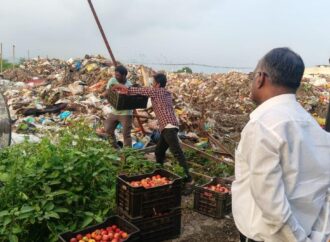 Food Manifest
Food Manifest
The house of resource for food safety.
Blog 1 Column Left Sidebar
- Home
- Blog 1 Column Left Sidebar
Latest Posts

Rotten Apples Seized; Srivilliputtur Fruit Shops Pulled Up for Violations0
- A to Z, Food Hygiene, Food Safety, Health & Wellness, News
- December 6, 2025
Key Update Food safety officials in Srivilliputtur, near Madurai, seized 82 kilograms of rotten apples from a private fruit vendor’s godown on Friday and immediately destroyed the unsafe stock at the municipal yard to keep it out of the market. Raid Exposes Unlicensed Outlets Officials inspected five other shops run by the same vendor on
READ MORE
Rock Salt or Iodised Salt? Choose Wisely0
- A to Z, Food Hygiene, Food Safety, Health & Wellness, News
- June 21, 2025
Salt is an everyday essential in every kitchen, but not all salts are the same. In many Indian households, you’ll often find both rock salt and black salt, alongside regular iodised salt. The latter is valued for its mild taste, natural trace minerals, and traditional use, especially during religious fasting. Black salt, with its tangy,
READ MORE
Roasted Chickpeas Adulteration Raises Fresh Food Safety Concerns0
- A to Z, Food Hygiene, Food Safety, News
- October 31, 2025
Key Update Food adulteration in India has reached alarming levels. From vegetables polished with chemicals to fruits coated with wax, consumers unknowingly risk their health every day. What appears fresh and tasty in the market often hides toxic substances beneath. A recent viral instagram video has exposed a disturbing trend — roasted chickpeas, considered a
READ MORE
Ritz Pulls Peanut Butter Crackers in 8 States Over Dangerous Labeling Slip0
- A to Z, Food Hygiene, Food Safety, Health & Wellness, News
- December 5, 2025
Key Update Ritz, a popular American snack brand, recalled its Peanut Butter Cracker Sandwiches in eight U.S. states after a labelling error that could trigger severe allergic reactions in people with peanut allergies. The Food and Drug Administration (FDA) confirmed that retailers in New York, New Jersey, Pennsylvania, Georgia, Arkansas, Missouri, Oklahoma, and Alabama received
READ MORE
Rising Temperatures May Drive Higher Sugar Intake, US Study Warns0
- A to Z, Food Hygiene, Food Safety, Health & Wellness, News
- September 9, 2025
Overview A US Study analysed the eating habits of nearly 60,000 US households and found that as daily temperatures rose, so did the intake of products like soda, juices, and ice creams. The increase was most evident among low-income and less-educated groups, suggesting that climate change may deepen existing health inequalities. Published in Nature Climate
READ MORE
Rising Food Safety Complaints in Kerala: Legal Ways to Report0
- A to Z, Food Hygiene, General, Health & Wellness, News
- October 3, 2025
Increase in Complaints and Risks Kerala authorities have observed a growing number of complaints against hotels and restaurants related to hygiene lapses, adulteration, and foodborne illnesses. Officials note that some incidents escalate due to tensions or confrontations, especially during busy tourist seasons or festivals. They caution consumers not to take matters into their own hands
READ MORE









